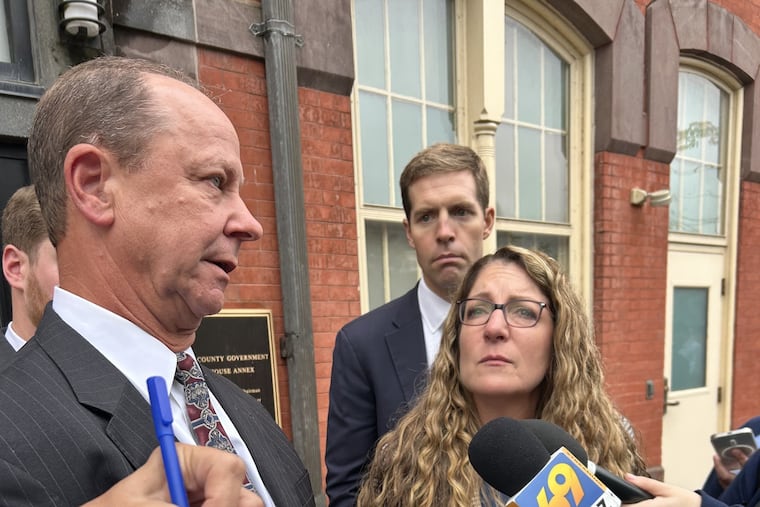Penn State ex-frat members sentenced to prison in fraternity hazing incident where Tim Piazza was fatally injured
Brendan Young, 28, of Philadelphia, and Daniel Casey, 27, originally from Ronkonkoma, N.Y., were told to report to the Centre County Correctional Facility on Monday.

BELLEFONTE, Pa. — A Centre County judge on Tuesday sentenced the former leaders of a Pennsylvania State University fraternity where Timothy Piazza was fatally injured in 2017 to two to four months in prison and three years’ probation.
Brendan Young, 28, of Philadelphia, and Daniel Casey, 27, originally from Ronkonkoma, N.Y. — who had been fraternity president and vice president — were told to report to the Centre County Correctional Facility on Monday. They had pleaded guilty in July to one count of reckless endangerment and multiple counts of hazing following their involvement in a booze-fueled hazing party seven years ago.
Casey and Young are the final two fraternity brothers to be sentenced in the case, and they received the stiffest penalties; several others previously got house arrest, according to the Pennsylvania Attorney General’s Office.
In explaining his sentence, Judge Brian Marshall said toward the end of the five-hour proceedings that both men accepted leadership roles in Beta Theta Pi and knew of its long-standing hazing practices. They should have shown leadership that night in stopping the ritual, he said. And while they may have accomplished much in their lives over the last 7½ years, “there’s no doubt Timothy Piazza” would have “had a future that was equally bright,” Marshall said.
» READ MORE: Two former PSU frat brothers enter guilty pleas in fraternity hazing incident in which Tim Piazza was fatally injured
But Piazza, then a sophomore mechanical engineering major, never got the chance. He passed through a drinking gauntlet that February night as part of the hazing, later fell down stairs, and languished on a couch for nearly 12 hours before anyone called for help. He died of his injuries at a hospital.
The case drew national attention in part because video surveillance from the house that night was played in court — about an hour of it was played again for Marshall on Tuesday — showing Piazza falling repeatedly and being carried by fraternity brothers to a couch.
‘Nothing brings Tim back’
“Everything has changed for me,” Evelyn Piazza told the judge in her victim-impact statement. “The thought of Tim and of missing Tim is always on my mind. Tears are always lurking just under the surface of my emotions. I have PTSD. … It killed my faith and belief in God.”
» READ MORE: Penn State frat death raises questions for grieving parents
Jim Piazza said the family needed the fraternity leadership to be held accountable. The fraternity, he said, “played Russian roulette with the pledges, and Tim got the bullet.”
As Young and Casey were sentenced, the Piazzas watched from the front row of the courtroom with their son Michael, who also made a statement. Young and Casey had hoped to avoid jail time; their attorneys had requested probation, blaming a faulty fraternity culture for the events that night rather than their clients’ leadership.
But the Piazzas, who have spent the last 7½ years educating students and parents about hazing dangers, getting tougher hazing laws passed, prodding universities to enact punishments, and seeking justice for their son, said last week they felt some jail time was merited.
Speaking outside the courthouse after the proceedings, Jim Piazza called the sentence “well-reasoned and fair” and said he hoped it would send the message that “hazing someone to death and hazing in general is not acceptable in Centre County or the state of Pennsylvania.”
The Piazzas were integral in getting a new hazing law passed in Pennsylvania, named for their son.
“Nothing brings Tim back,” Evelyn Piazza said. “But I think it was important that jail be assessed so that future hazers will look at that and see … serious repercussions for hazing and that you can’t just blame the system.”
‘Severe … reputational consequences’
During his statement, Casey stood and faced the Piazzas as he addressed the court through tears.
“Every day, I think about Tim, your family, and the role I played in this tragedy,” said Casey, who has since married and finished graduate school.
Young, who remained seated and facing the judge, noted that he has since graduated magna cum laude from Temple University with degrees in accounting and finance and recently received a promotion at the firm where he works.
He expressed sorrow and regret for his actions that night and said he should have done something to stop the hazing activities.
“I am truly sorry,” he said. “I should have stepped in and called for help to make sure Tim was safe.”
Lawyers for Young and Casey did not return calls for comment.
Before the sentencing, Jeff Rundle, CEO of the national Beta Theta Pi fraternity, made a statement on behalf of the prosecution.
“The consequences of this case should serve as a stark warning to others who may one day be in a position of influence over young lives,” he said.
The fraternity, he said, has faced “severe legal, financial, and reputational consequences” in the aftermath of Piazza’s death and the permanent ban of Beta Theta Pi from Penn State’s campus. The fraternity’s attempts to establish chapters on other campuses have been “delayed, rescinded, or outright denied,” he said.
More than two dozen other Beta Theta Pi members previously entered pleas to charges including hazing, conspiracy to commit hazing, and furnishing alcohol to minors. (A civil suit the Piazzas filed against fraternity members is ongoing.)
Young and Casey also face having to make restitution to the Piazzas, but that will be decided at future hearings, the family’s lawyer said. They also were assigned community service.